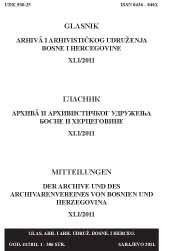Historiografski značaj latinske isprave bosanskog bana Prijezde o darivanju župe Zemljanik hrvatskim Babonićima
Historiographic relevance of Ban Prijezda's Latin document on endowing Zemljanik parish to Croatian Babonićs
Author(s): Nermina HalilovićSubject(s): History
Published by: Arhivističko udruženje Bosne i Hercegovine AUBiH
Summary/Abstract: Latin documents Prijezda Ban issued May 8 1287th years is a very important source for the very diplomatic history of the medieval Bosnian state. First of all, it should be noted that the original of the documents found in the Hungarian National Archives (Magyar Országos Levéltár) and that, until now, thought that the original is lost. Found a script that, for the first time, a detailed treatment of the external characteristics of a document (letter, material, ink, sign, seal), comparing earlier published transcriptions of text documents and detect possible errors in transcription. Diplomatic documents is important for its diplomatic formulas: verbal invocation, intitulacija with devotion, the inscription, salutacija, Arenga, promulgation, dispositions, and koroboracija dating, without the existence of other diplomatic formula such as: the oath, sanctions, etc., but which are less important than formulas that document contains. Historiographic are all important parts of the documents because they provide valuable information about Ban Prijezda, his children, family, wearing a Croatian family Babonić and developing diplomatic relations with neighboring countries. Kak see ban Prijezda had three sons, Stephen, wolf and Prijezda and daughter, unknown name by marrying the son of Stephen Vodičkog. As a dowry is a gift ban Zemljanik parish, situated between the parish and Vrbanja Banica, with all the border villages, which was 23rd In this way the ban Prijezda redemption continues tying his descendants because he had already married with a son, Stephen Jelisaveta, daughter of the Serbian king Dragutin. In this way, the Bosnian rulers since the time of Ban Prijezda, progenitors Kotromanić dynasty, and even those who came after him, trying to strengthen family ties regarding their country and the surrounding European countries. All this is understandable, no reflection on the concrete relations (political, economic and otherwise) of medieval with other states. These family ties are medieval Bosnia offered a lot but she was there and the other, negative side to the outbreak of a conflict between the Bosnian rulers and “Bosnian sons in” the division of the dowry because it often required more than what they were intended.
Journal: Glasnik arhiva i Arhivističkog udruženja Bosne i Hercegovine
- Issue Year: 2011
- Issue No: 41
- Page Range: 177-187
- Page Count: 11
- Language: Bosnian
- Content File-PDF

